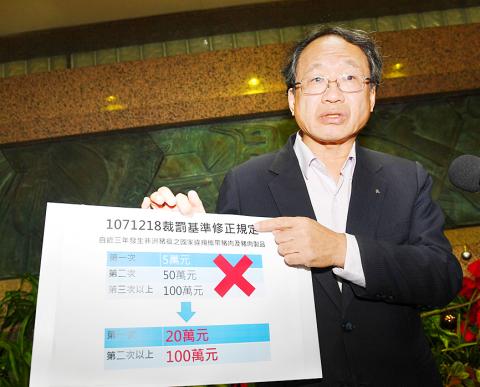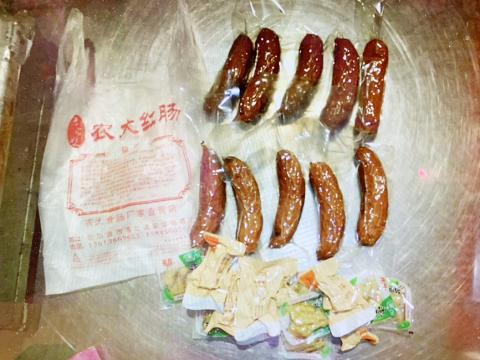A central emergency operation center to oversee efforts to prevent African swine fever contagion is to open today, while fines for people caught illegally importing pork products from virus-affected areas have been increased, the Council of Agriculture (COA) said yesterday.
As most Chinese provinces have reported cases and illegal imports of Chinese meat products continue to be intercepted by customs agents, the government will step up prevention measures, the council said.
Premier William Lai (賴清德) and other officials are to attend the center’s first meeting today, COA Deputy Minister Huang Chin-cheng (黃金城) said.

Photo: CNA
Lai would also attend a nationwide drill simulating an outbreak, which was originally scheduled for Friday, but was postponed to Wednesday next week, Huang said.
On Friday, fines for people caught illegally importing meat products from any area increased from between NT$3,000 and NT$15,000 (US$97 and US$486) to between NT$10,000 and NT$1 million.
However, those found importing pork products from virus-affected areas face a fine of NT$50,000 for the first violation, NT$500,000 for the second and NT$1 million thereafter, Huang said.

Photo courtesy of Bureau of Animal and Plant Health Inspection and Quarantine
Despite the higher fines, officials had intercepted 41 illegal meat imports since Friday, of which 15 were pork products from China or other affected areas, which prompted the council to revise the fines, Huang said.
From today, people face a fine of NT$200,000 for the first instance of illegal imports from affected areas and NT$1 million for subsequent breaches, Huang said.
While the council has said its data showed that most of those caught illegally importing meat products were Taiwanese, many of them were Chinese or Vietnamese spouses of Taiwanese traveling on Republic of China (ROC) passports, Huang said.
The council would ask airlines to increase inflight broadcasts of its policies in Vietnamese and boost policy promotion among local associations, he said.
Meanwhile, netizens have reported receiving pork products as “gifts” with online purchases in parcels delivered from China without being told that they would be included, Huang said.
People who receive such items must contact their local animal quarantine bureau to have them properly disposed of, not dump the products themselves, Huang said.
There is no penalty for failing to report such items, he said.
The council is working on ways to detect meat products in parcels at customs, he said.
If pork products carrying the virus are consumed by pigs, it could ruin the nation’s hog industry, the council has said.
It could take decades for the industry to recover, as there is no vaccine for the fatal disease, it has said.
Separately yesterday, Mainland Affairs Council (MAC) Minister Chen Ming-tong (陳明通) accused China of mismanaging the outbreak.
China’s failure to bring the disease under control could deal a heavy blow to Taiwan’s hog industry, Chen said.
“The epidemic is a very serious matter,” he said, adding that Beijing has lost control of the situation.
“China has mismanaged the situation, which has forced Taiwan to step up management and inspection,” he said at a meeting of the legislature’s Internal Administration Committee.
The MAC has asked Beijing three times to hold bilateral talks on measures to combat the disease, including banning e-commerce platforms from selling foreign pork products, with the latest request issued on Dec. 14, Chen said.
“However, the Chinese side has yet to respond,” he said, urging Beijing to set aside political considerations to fight the epidemic.
Additional reporting by CNA

PREPAREDNESS: Given the difficulty of importing ammunition during wartime, the Ministry of National Defense said it would prioritize ‘coproduction’ partnerships A newly formed unit of the Marine Corps tasked with land-based security operations has recently replaced its aging, domestically produced rifles with more advanced, US-made M4A1 rifles, a source said yesterday. The unnamed source familiar with the matter said the First Security Battalion of the Marine Corps’ Air Defense and Base Guard Group has replaced its older T65K2 rifles, which have been in service since the late 1980s, with the newly received M4A1s. The source did not say exactly when the upgrade took place or how many M4A1s were issued to the battalion. The confirmation came after Chinese-language media reported

A Ministry of Foreign Affairs official yesterday said that a delegation that visited China for an APEC meeting did not receive any kind of treatment that downgraded Taiwan’s sovereignty. Department of International Organizations Director-General Jonathan Sun (孫儉元) said that he and a group of ministry officials visited Shenzhen, China, to attend the APEC Informal Senior Officials’ Meeting last month. The trip went “smoothly and safely” for all Taiwanese delegates, as the Chinese side arranged the trip in accordance with long-standing practices, Sun said at the ministry’s weekly briefing. The Taiwanese group did not encounter any political suppression, he said. Sun made the remarks when

The Taiwanese passport ranked 33rd in a global listing of passports by convenience this month, rising three places from last month’s ranking, but matching its position in January last year. The Henley Passport Index, an international ranking of passports by the number of designations its holder can travel to without a visa, showed that the Taiwan passport enables holders to travel to 139 countries and territories without a visa. Singapore’s passport was ranked the most powerful with visa-free access to 192 destinations out of 227, according to the index published on Tuesday by UK-based migration investment consultancy firm Henley and Partners. Japan’s and

BROAD AGREEMENT: The two are nearing a trade deal to reduce Taiwan’s tariff to 15% and a commitment for TSMC to build five more fabs, a ‘New York Times’ report said Taiwan and the US have reached a broad consensus on a trade deal, the Executive Yuan’s Office of Trade Negotiations said yesterday, after a report said that Washington is set to reduce Taiwan’s tariff rate to 15 percent. The New York Times on Monday reported that the two nations are nearing a trade deal to reduce Taiwan’s tariff rate to 15 percent and commit Taiwan Semiconductor Manufacturing Co (TSMC, 台積電) to building at least five more facilities in the US. “The agreement, which has been under negotiation for months, is being legally scrubbed and could be announced this month,” the paper said,